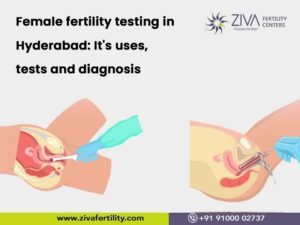A couple is known to experience secondary infertility if they cannot conceive or carry the pregnancy for the whole period if they previously had a child already. The earlier pregnancy should not have occurred with fertility medications or treatments, like IVF etc. The earlier pregnancy must have occurred naturally. The couple is diagnosed as secondary infertile if they cannot conceive after trying for six months to a year. Recurrent pregnancy loss is also termed secondary infertility.
What are the symptoms and causes of Secondary Infertility?
Either one of the partners can be the cause of secondary infertility. Out of all the cases of secondary infertility, women are responsible in one-third of cases, and men are the cause in one-third cases. The remaining one-third is due to many combining factors such as :

- Older age
- Health complications during previous pregnancies
- Any surgeries have undergone after the earlier pregnancy,
- Obesity or weight gain
- Sexually transmitted diseases
- Impaired sperm production
- Excessive alcohol consumption or smoking
What causes secondary infertility in women?
Causes of secondary infertility in women include:
Issues with eggs: A limited number of eggs women are born with. By the time women try for another child, if her age crosses 35, both the quality and quality of eggs reduce. This is a primary concern, and there could be other issues with eggs such as autoimmune or genetic conditions, surgeries or radiation.
Issues with fallopian tubes: After a successful pregnancy, due to pelvic infections such as chlamydia or gonorrhoea, the fallopian tubes can become blocked.
Issues in the uterus: Caesarean delivery can create adhesions inside the uterus. Benign (non-cancerous) growths inside the uterus, such as Fibroids or polyps, impair pregnancy.
Weight gain or other lifestyle changes: excessive alcohol consumption and smoking affect fertility. An increase in weight leads to ovary dysfunction.
What causes secondary infertility in men?
- Testosterone level reduction:
This is caused by:-
- Genital infections.
- Thyroid diseases.
- Diabetes.
- Tuberculosis.
- Blood diseases.
- Benign tumours.
- Emotional stress.
- Myocardial infarction.
- Respiratory failure.
- Testicular varicocele: The veins in the scrotum, or the sack of skin encasing the testicles, get enlarged. Around 30% of infertile men have testicular varicocele.
- Poor-quality semen: After 40 years of age, the quality of semen tends to decline.

- Prostate enlargement/ prostate removal – These conditions affect the sperm count and hinder ejaculation.
- Suppose men use commercial sexual lubricants which are toxic to sperm. It’s best to use non-toxic natural lubricants like peanut, safflower, vegetable oils, and petroleum jelly.
- Continuous exposure to pesticides, lead, industrial chemicals, and radiation impacts a man’s fertility.
- Obesity or excess weight decrease testosterone levels.
What should a couple do if they suspect secondary infertility?
Your medical history, menstrual cycles, and ovulation cycles are crucial in determining secondary infertility. The earlier you detect, the better treatment options you will have. Consult a reproductive specialist if you cannot conceive even after trying for six months to a year (6 months for above 35 years of age, one year for below 35 years of women’s age).
How can a couple be blessed with a child despite Secondary Infertility?
Below are various drugs, surgeries and ART’s to have a child despite having Secondary Infertility:-
- Ovulation inducing medications as prescribed by your medical specialist.
- Antioxidants and anti-ageing supplements can increase men’s fertility and improve semen quality.
- ART – Intrauterine insemination (IUI) – In this process, the sperm is inserted inside a woman’s uterus. The sperm can be from the male partner or a donor. The timing must be so that the procedure is performed around the women’s ovulation period.

- ART – In vitro fertilization (IVF) – This procedure involves
- Daily injections to stimulate the ovaries
- A surgical procedure to retrieve eggs
- Egg fertilization in a lab to make embryos
- Growth of embryos in the lab
- Transfer of an embryo into the uterus.
Donors can be used. Some women freeze their eggs, and those eggs can also be used. Using donor sperm is also a widespread practice in IVF.
- Surgery: This option is best to remove/repair structural problems, such as removing scar tissue, polyps, and fibroids from the uterus. Surgery can also repair the testicular varicocele.
Secondary infertility has an emotional impact on the couple and the family too. We at ZIVA fertility center not only provide you with clinical and medical treatment, but we also offer to counsel. We will be with you throughout the journey and suggest the best option to fulfill your dream. Call us at +91-9100002737, +91 93474 06900 or mail us at Info@zivafertility.com.
















